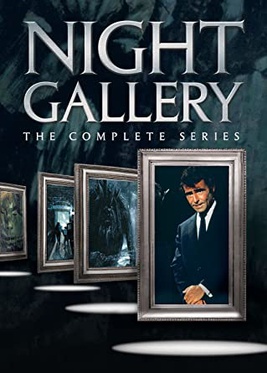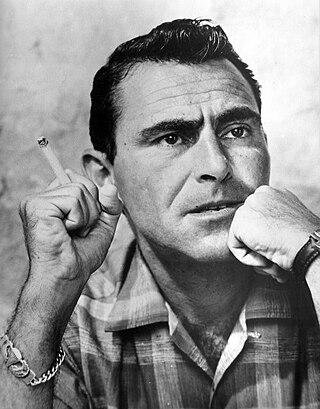
The Twilight Zone is an American media franchise based on the anthology television series created by Rod Serling in which characters find themselves dealing with often disturbing or unusual events, an experience described as entering "the Twilight Zone". The episodes are in various genres, including fantasy, science fiction, absurdism, dystopian fiction, suspense, horror, supernatural drama, black comedy, and psychological thriller, frequently concluding with a macabre or unexpected twist, and usually with a moral. A popular and critical success, it introduced many Americans to common science fiction and fantasy tropes. The first series, shot entirely in black-and-white, ran on CBS for five seasons from 1959 to 1964.

Night Gallery is an American anthology television series that aired on NBC from December 16, 1970, to May 27, 1973, featuring stories of horror and the macabre. Rod Serling, who had gained fame from an earlier series, The Twilight Zone, served both as the on-air host of Night Gallery and as a major contributor of scripts, although he did not have the same control of content and tone as he had on The Twilight Zone. Serling viewed Night Gallery as a logical extension of The Twilight Zone, but while both series shared an interest in thought-provoking dark fantasy, more of Zone's offerings were science fiction while Night Gallery focused on horrors of the supernatural.

Rodman Edward Serling was an American screenwriter and television producer best known for his live television dramas of the 1950s and his anthology television series The Twilight Zone. Serling was active in politics, both on and off the screen, and helped form television industry standards. He was known as the "angry young man" of Hollywood, clashing with television executives and sponsors over a wide range of issues, including censorship, racism, and war.

"Where Is Everybody?" is the first episode of the American anthology television series The Twilight Zone and was originally broadcast on October 2, 1959, on CBS. It is one of the most realistic Twilight Zone episodes, as it features no supernatural elements and is based on fairly straightforward extrapolation of science.
"Walking Distance" is episode five of the American television series The Twilight Zone. It originally aired on October 30, 1959. The episode was listed as the ninth best episode in the history of The Twilight Zone by Time magazine.
"What You Need" is the twelfth episode of the American television anthology series The Twilight Zone, airing on Christmas Day, 1959. It is based on the short story of the same name by Lewis Padgett, which was published in the October 1945 issue of Astounding Science Fiction magazine.
"I Shot an Arrow into the Air" is the fifteenth episode of the American television anthology series The Twilight Zone.

"The Big Tall Wish" is episode twenty-seven of the American television anthology series The Twilight Zone, with an original score by Jerry Goldsmith. It originally aired on April 8, 1960, on CBS. This was one of a few Twilight Zone episodes to feature black actors in lead roles, a rarity for American television of the era.
"A Nice Place to Visit" is episode 28 of the American television anthology series The Twilight Zone. The episode first aired on CBS on April 15, 1960. The title comes from the saying, "It's a nice place to visit, but I wouldn't want to live there."
"A World of His Own" is episode thirty-six of the American television anthology series The Twilight Zone. It was the last episode of the show's first season and essentially comedic in tone. It originally aired on July 1, 1960, on CBS.
"The Night of the Meek" is episode 47 of the American television anthology series The Twilight Zone. It originally aired on December 23, 1960, on CBS. It was one of the six episodes of the second season which were shot on videotape in a short-lived experiment aimed to cut costs.
"Mr. Dingle, the Strong" is episode 55 of the American television anthology series The Twilight Zone, and is the 19th episode of the second season. It was one of the many episodes in the second season written by series creator and showrunner Rod Serling, and was directed by German filmmaker John Brahm. The episode originally aired on March 3, 1961 on CBS.
"A Kind of a Stopwatch" is a 1963 episode of the American television anthology series The Twilight Zone. In this episode, a man acquires a stopwatch which can stop time.

Playhouse 90 is an American television anthology drama series that aired on CBS from 1956 to 1960 for a total of 133 episodes. The show was produced at CBS Television City in Los Angeles, California. Since live anthology drama series of the mid-1950s usually were hour-long shows, the title highlighted the network's intention to present something unusual: a weekly series of hour-and-a-half-long dramas rather than 60-minute plays.

The Twilight Zone is an American fantasy science fiction horror anthology television series created and presented by Rod Serling, which ran for five seasons on CBS from October 2, 1959, to June 19, 1964. Each episode presents a standalone story in which characters find themselves dealing with often disturbing or unusual events, an experience described as entering "the Twilight Zone", often with a surprise ending and a moral. Although often considered predominantly science-fiction, the show's paranormal and Kafkaesque events leaned the show much closer to fantasy and horror. The phrase "twilight zone" has entered the vernacular, used to describe surreal experiences.
"The Long Morrow" is episode 135 of the American television anthology series The Twilight Zone. It originally aired on January 10, 1964 on CBS. In this episode, an astronaut falls in love on the eve of a 40-year-long space voyage. The story focuses on how he and his lover confront the problem that his 40 years in suspended animation will cause a wide age disparity between them by the time he returns.
"Mr. Garrity and the Graves" is an episode of the American anthology television series The Twilight Zone.
"The Comedian" is a 1957 live television drama written by Rod Serling from a novella by Ernest Lehman, directed by John Frankenheimer, and starring Mickey Rooney, Edmond O'Brien, Kim Hunter, Mel Tormé and Constance Ford.

Westinghouse Desilu Playhouse is an American television anthology series produced by Desilu Productions. The show ran on the Columbia Broadcasting System between 1958 and 1960. Three of its 48 episodes served as pilots for the 1950s television series The Twilight Zone and The Untouchables.








